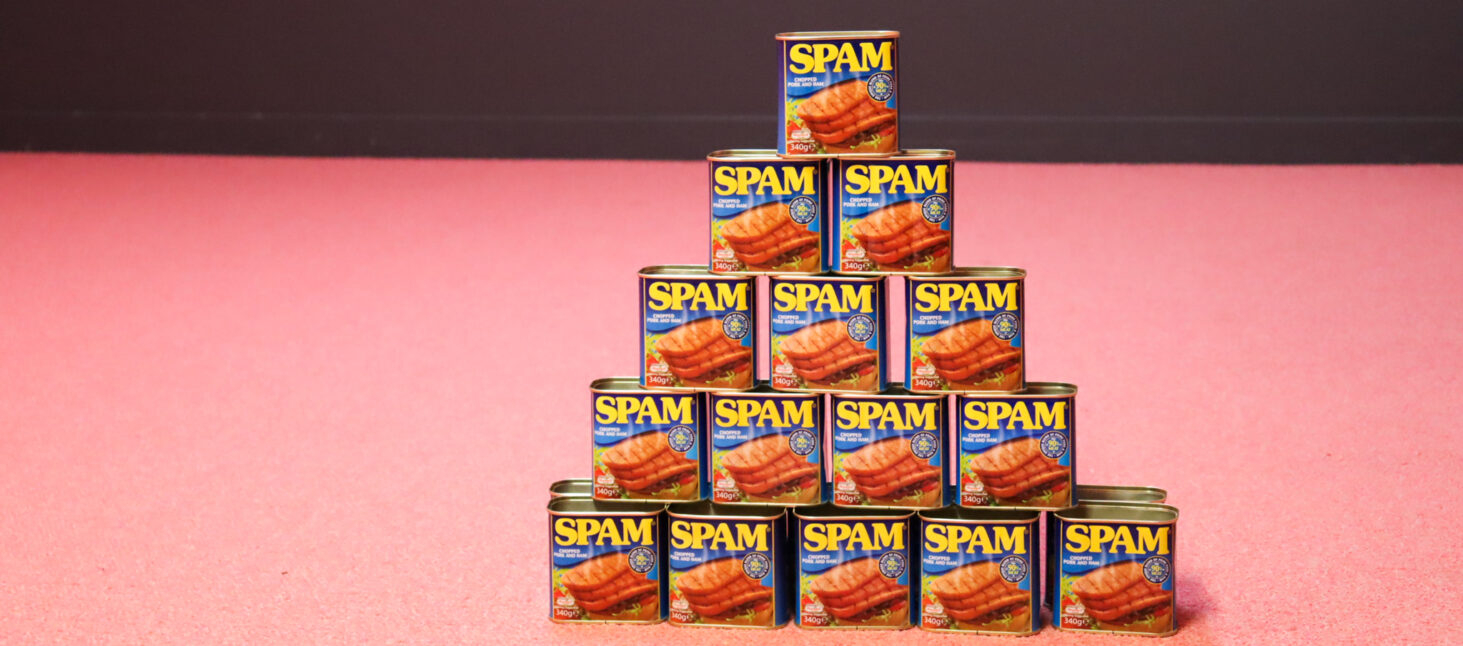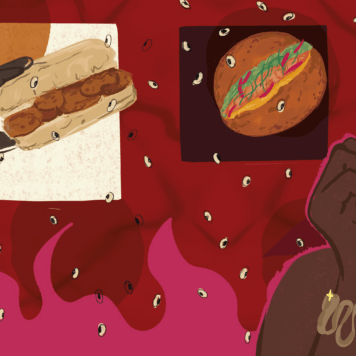Spam has become so demonised that it is now synonymous with junk: that which is unwanted, that lacks substance. But the canned meat holds so much more emotionally, culturally and historically. And it’s not just the food itself that suffers – the stigma around Spam is symptomatic of the colonial, classist and often racist attitudes that pervade the food and wellness industries.
Imperial roots
You could say that Spam originated from a zero waste concept – albeit a capitalist one – when in 1936, meat processor George A. Hormel & Co looked to boost sales of pork shoulder (a meat considered an offcut at the time). It was introduced into the US food market a year later, where sales were slow and steady until the US declared war on Japan and its allies in 1941.
Spam then became widely distributed during World War II – with more than 100 million pounds shipped abroad – not only to American troops, but also to the UK as part of the Lend-Lease agreement between the two countries. Meat was the last item to be de-rationed under the UK’s 14-year long food rationing programme, ending completely in 1954. Spam’s reputation in the UK as a “wartime delicacy” soon turned into one of ridicule with the televising of the synonymous Monty Python sketch in 1970.
Many American soldiers resented eating Spam and sent hate mail to the company. In response, president Jay Hormel told the New Yorker in a 1945 interview, “If they think Spam is terrible, they ought to have eaten the bully beef [more commonly known as corned beef in the UK] we had in the last war.”
While the US military were complaining about the ubiquity of their own product – which they imported because they distrusted native food and the people – Spam became part of the cuisines in the countries they occupied and invaded.
Colonial legacies
Spam is beloved outside of the US and UK, in Hawaii, Hong Kong, Japan, the Philippines and South Korea. It is also popular in Guam, which is still occupied by the US military.
In her one-woman show, For The Love of Spam, CHamoru and Filipina artist Sierra Sevilla talks about her feelings about the food and her experiences growing up in her native country, Guam. I saw the show on its opening night at the Edinburgh Fringe festival and was blown away by Sierra’s performance, storytelling and writing.
I caught up with Sierra about her experiences and her inspiration. “I wanted to bring a new perspective on what modern day colonialism looks like,” she tells me. “People might think of it as invading and suppressing local people – but it’s also about controlling resources.”
In the show, she talks about how Guam experiences typhoons, but that aid is unpredictable. “If you haven’t eaten Spam,” Sierra tells the audience, “then you haven’t experienced days or weeks of power outages.”
Availability and accessibility, as well as budget, are factors often ignored by the “eat fresh” narratives. Corned beef was commonplace in my childhood. It has similar imperial links to Spam, and is also pre-cooked meat with a long shelf life.
“It’s funny how Spam is a metaphor for US colonialism,” Sierra tells me. “The US gave us Spam in World War II, but they don’t like it. In a similar way to how they own Guam, but don’t look after the Indigenous people. They only look after their own military.”
I feel that this is such an incisive comparison, and one that extends beyond state-level. This colonial mindset is ingrained in much of British culture, particularly when it comes to a presence abroad. We see this in the prevalence of “expat” communities in countries where the Sterling has significant buying power, including in my birth country of Thailand. There is an entitlement to travel, but an expectation to not have to integrate into the communities, to still be able to access British products, and so on. Food is entwined in this superiority complex.

The cultural importance of food
Sierra tells me that the show was born from an argument with her husband, which exposed the challenges of marrying outside your culture. “I was upset that he wouldn’t eat Spam,” she tells me. “And it made me think about our future if we lived in the UK. Would our future children also be made to feel embarrassed about eating it? What else about their heritage would they be ashamed of?”
The questioning of cuisine, culture and identity is a head-spin that is painfully familiar as a fellow mixed white and Asian person. It mirrors my own experience growing up in a majority white environment as a child who was desperate to assimilate. It is also why I find conversations around “authenticity” particularly toxic – as these can come with notions of purity. While at the same time, a cuisine and its people are reduced to a monolith.
In her show, Sierra talks about moving to the US for university, where her white roommates make derogatory comments about her cooking Spam. She makes a sharp comparison to the processed nature of hotdogs, which don’t receive the same flak. It reminds me how the superiority and stigma around food is not only tied to wealth and class, but is often times racially coded.
For example, durian – a delicious fruit indigenous to Southeast Asia – is usually noted remarked on by white people because of its smell. The focus on how “stinky” the fruit is insinuates that this extends to the culture and its people. Yet pungent cheese, with literal mould in it, is revered as a delicacy.
Sierra and I talk about these hypocrisies. “I want people to stop and think when they judge other people’s food,” she tells me, “to ask themselves: What does the food mean to them? Why is it an important part of their culture? I want to create a more tolerant world when it comes to eating different foods.”
Complicated relationships
Food can also bring us conflicting and difficult emotions. Becoming vegetarian in 2018 – and later vegan – I felt like I was losing access to my culture as I grappled with giving up staples such as fish sauce and oyster sauce. My sense of belonging was further diminished when I felt disillusioned by the prevalence of white veganism, including the appropriation of Global Majority cuisines, the bro-ification of plant-based meat alternatives, and the overlap with the toxicities of diet culture.
One of my favourite lines from the show is when Sierra echoes these mixed feelings around food. “Sometimes when I eat Spam,” she says, “I think to myself: is this an act of rebellion or an act of submission?”
This powerfully encapsulates the impact of colonialism on food, and how we can hold multiple feelings at once. “Is it submission because I’m relying on what they gave us to be here, to survive?” she tells me. “Or is it rebellion because I’ve made the food delicious, accessible, nourishing, and part of my community?”
Subscribe to shado's weekly newsletter
Exclusive event news, job and creative opportunities, first access to tickets and – just in case you missed them – our picks of the week, from inside shado and out.

We both talk about how many Global Majority cultures are centred around food, and how this sometimes feels at odds with our experiences in the UK. I have joked to friends that I’m always concerned about mealtimes when socialising, but speaking with Sierra makes me realise that the friction I feel in these situations is because eating communally is important to me.
“It’s a love language,” Sierra says, “it’s how we spend time together, how we share, and it shows that we care about each other.”
Near the end of the show, Sierra makes a Spam dish on stage. At the end, I waited outside, eager to taste what Sierra was serving. This is ultimately what food should be about: to make connections, to make us proud of our culture, and to celebrate our differences.
And it tasted amazing.
What can you do?
See:
- For The Love Of Spam is showing everyday at the Pleasance until 26th August at 14:10. Sierra plans to tour the show around the UK following the Edinburgh Fringe, and in New Zealand next year. Follow Sierra on Instagram for updates.
Eat:
- Budae jjigae, translated as “army base stew” – this Korean dish was invented when the US army was stationed in Uijeongbu, near Seoul during the Korean War. The stew hits those key notes beautifully: spicy, salty and umami
- Spam sisig – this variety of the Philippine dish came about when Filipinos repurposed excess pork from the US airbase in Pampanga. Sierra recommends adding mayo if you want that creaminess.
- Spam musubi – Sierra’s favourite cinema snack
- Corned beef silog – a hearty Filipino breakfast
Read:
- Why Spam is the best solo food by Eric Kim
- Colonialism in a Can by Elaine Castillo
- Other shado articles on food













